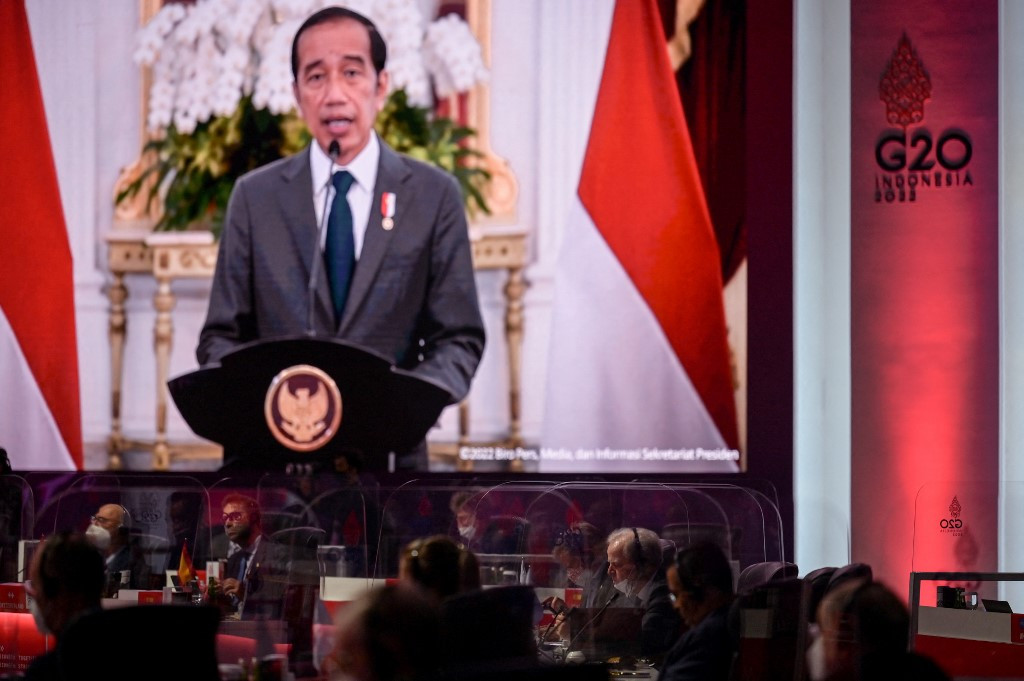Popular Reads
Top Results
Can't find what you're looking for?
View all search resultsPopular Reads
Top Results
Can't find what you're looking for?
View all search resultsThe G20 summit, ASEAN and Indonesia
I think now President Jokowi understands that international and domestic affairs are two sides of the same coin and must be pursued in parallel.
Change text size
Gift Premium Articles
to Anyone

The Group of 20 Summit will take place on Nov. 15-16 in Bali, and the government is preoccupied with the process and preparations leading to the event.
Learning from the G20 Foreign Ministers Meeting and G20 Finance Ministers and Central Bank Governors Meeting earlier this month, we could assume that some objectives have been reasonably achieved. Given the number of ministers attending, plus the observers present at the two meetings, we can safely conclude that the November summit will be attended by the leaders as well, after threats of a boycott a few months ago.
But in terms of substance, there is still a long way to go to measure the success of the summit. The implications of the war in Ukraine will very much influence the documents to be produced by the G20. For instance, whether the war should be mentioned or not in the meeting statement is the first question to answer at the summit.
There are important decisions to be made in November. These decisions should encompass all sectors, and be balanced in all aspects, to be accepted by all G20 members. I believe that the international community respects President Joko “Jokowi” Widodo in his efforts to make the G20 a success, and this will be an important factor leading up to the summit.
President Jokowi has now proved that foreign policy is a priority, and that he is capable of playing a significant role in diplomacy and international affairs. He has shown his mettle as somebody who is a quick-learner and self-assured about the art of international affairs. As the president of the Republic of Indonesia, he has had to master international affairs, and has adjusted well to becoming an international statesman.
His most recent initiative to make ASEAN+3 an important intermediate regional body is brilliant, and could be useful in promoting ASEAN’s role on the global stage. ASEAN needs its Northeast Asian partners, namely China, Japan and the Republic of Korea, to maintain its centrality.
I think now President Jokowi understands that international and domestic affairs are two sides of the same coin and must be pursued in parallel. ASEAN+3 is a very important intermediate regional framework for ASEAN to play its role in the greater East Asia.
Back to G20, there are a number of important issues on the agenda, including the war in Ukraine, the food and energy crises, the international financing of aid programs, the problem of the debt plaguing developing countries, the problem of financing in relation to the pandemic and the problems of transportation and supply chains.
These are all important and should be dealt with as one entity. Some of them have been discussed at the two ministerial meetings this month. We shall wait and see how the G20 summit will address all of these issues.
After the G20, Indonesia must be ready to take up another important role, namely the chairmanship of ASEAN. Next year’s ASEAN summit will be held in Indonesia and hopefully will open the process of changing some parts of the “ASEAN way” that are not relevant for the future.
The last time Indonesia chaired ASEAN, in 2013, we were able to bring about positive changes through the creation of the three pillars of ASEAN, thus creating the political-security, economic and socio-cultural communities of ASEAN.
But the situation now has changed quite dramatically. The solidarity among ASEAN has declined, and Indonesia’s position among others has declined in the eyes of the other ASEAN members.
In the meantime, it has to be admitted that Indonesia’s attention toward ASEAN has also declined. This is especially now with the government’s full focus on the G20. The initiative to look toward ASEAN+3 in part also considers the need for support for the G20 Summit.
What can we really expect from ASEAN in the future?
We must remember that ASEAN is neither a united entity, nor a union, let alone a federal body. It is best described as simple collaboration by fully sovereign states that would like to do something together in the various areas of cooperation.
Yet, these states have always jealously guarded their sovereignty, which is why full-fledged cooperation has been difficult. The 10 ASEAN member countries have promised to do many things together but listen to almost no complaints if nothing gets implemented.
This has been the working culture or habit of ASEAN. Nonetheless, I believe that ASEAN could and should do better, because global and regional developments are now more complex and difficult. If ASEAN works together, we should respond to these challenges in an easier manner.
***
The writer is vice chair, board of trustees, CSIS Foundation.










